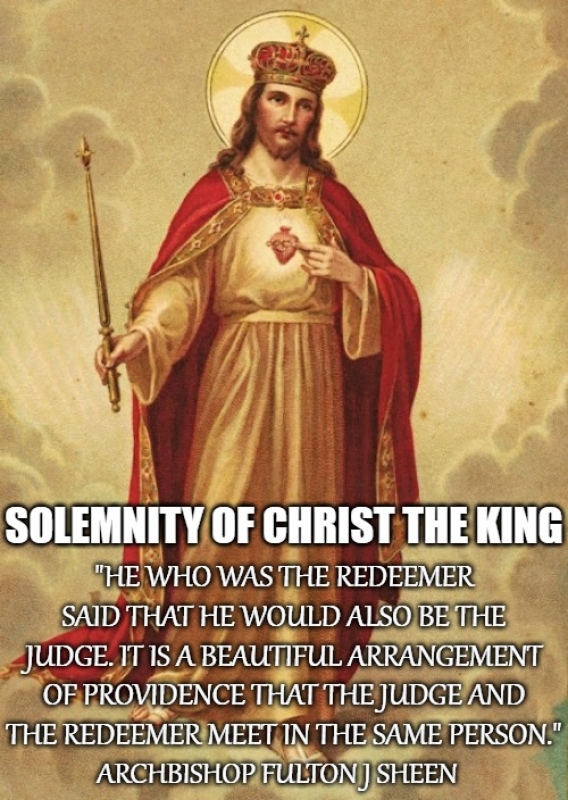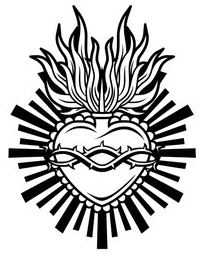Solemnity of Our Lord Jesus Christ, King of the Universe - 26 November
26th November 2023

Solemnity of Our Lord Jesus Christ, King of the Universe - 26 November
“When once men recognise, both in private and in public life, that Christ is King, society will at last receive the great blessings of real liberty, well-ordered discipline, peace and harmony.” - Pope Pius XI
A reflection on today's Gospel reading by the Venerable Archbishop Fulton J Sheen:
"Not only did Our Lord identify all Truth and Life with Himself, but He put forth His claim to judge the world—something no mere man would ever do. He said that as the Judge of all He would return again seated on a throne of glory and attended by the angels, to judge all men according to their works. Imagination recoils at the thought of any human being able to penetrate into the depths of all consciences, to ferret out all the hidden motives, and to pass judgment on them for all eternity. But this final judgment was a long way off and hidden from the eyes of men. There would be a symbol or rehearsal of the final judgment which would be the destruction of Jerusalem and which would be accomplished before the end of the actual generation of Christ’s day. It would also be a prelude to the final destruction at the end of the world, when the Kingdom of God would be established in its eternal and glorious phase.
"When He comes to judge it will not be merely the circumscribed area of the earth in which He laboured and revealed Himself; rather it will be all the nations and the empires of the world. The time of His second coming He knows not as man, but only as God. He will not tell it except in warning that it will be sudden, like lightning. He came as a “Man of Sorrows” then He shall come in His glory. The attributes of His suffering humanity will be necessary for His identification. Hence, after His Resurrection, He kept the scars. With Him will be the angels, and all the nations will be divided into two classes: sheep and goats. As He divided men on earth into two classes, namely, those who hated and those who loved Him, so He would divide them then. “I am the Good Shepherd,” He said of Himself. The title He would vindicate on the last day by a separation of His flock of sheep from the goats.
"The sheep will hear themselves commended for loving service to Him, even when it was unconscious service. There are many more people loving and serving Him than one suspects. It would seem that the most surprised of all will be the social workers who will ask, “When was it that we saw Thee hungry? Was it Case Number 643?” The wicked, on the other hand, will find themselves refusing Him when they refused to do anything for their fellow man in His name.
"[In Matthew 25:31-46] His words even imply that philanthropy has deeper depths than is generally realised. The great emotions of compassion and mercy are traced to Him; there is more to human deeds than the doers are aware. He identified every act of kindness as an expression of sympathy with Himself. All kindnesses are either done explicitly or implicitly in His name, or they are refused explicitly or implicitly in His name. Mohammed said that alms had to be given, but not in his name. Our Lord made that the condition, but as a mere man, it would have been foolishness. Furthermore, only an Omniscient Will could ever judge the motives behind all philanthropy to decide when it was charity, and when it was self-praise. That He claimed He would do and with such finality that the repercussions would be eternal. He Who was the Redeemer said that He would also be the Judge. It is a beautiful arrangement of Providence that the Judge and the Redeemer meet in the same Person.
"When one takes into account also His reiterated assertions about His Divinity—such as asking us to love Him above parents, to believe in Him even in the face of persecution, to be ready to sacrifice our bodies in order to save our souls in union with Him—to call Him just a good man ignores the facts. No man is good unless he is humble; and humility is a recognition of truth concerning oneself. A man who thinks he is greater than he actually is is not humble, but a vain and boastful fool. How can any man claim prerogatives over conscience, and over history, and over society and the world, and still claim he is “meek and humble of heart”? But if He is God as well as man, His language falls into place and everything that He says is intelligible. But if He is not what He claimed to be, then some of His most precious sayings are nothing but bombastic outbursts of self-adulation that breathe rather the spirit of Lucifer than the spirit of a good man. What avails Him to proclaim the law of self-renouncement, if He Himself renounces truth to call Himself God? Even His sacrifice on the Cross becomes a suspect and a dated thing, when it goes hand in hand with delusions of grandeur and infernal conceit. He could not be called even a sincere teacher, for no sincere teacher would allow anyone to construe his claims to share the rank and the name of the Great God in heaven.
"The choice that lies before men is either the hypothesis of culpable insincerity or the fact that He spoke the literal truth and, therefore, must be taken at His word. It is easier to believe that God has achieved His Works of Wonder and Mercy in His Divine Son on earth than to close the moral eye to the brightest spot that meets it in human history, and thus lapse into despair. No human could be good, aye! he would be arrogant and blasphemous, to have made the assertions He did concerning Himself. Instead of being above His moral followers who call themselves Christians, He would have been infinitely below the level of the worst of them. It is easier to believe what He said about Himself, namely, that He is God, than to explain how the world could ever have taken as a model such an unmitigated liar, such a contemptuous boaster. It is only because Jesus is God that the human character of Jesus is a manifestation of the Divine.
"We must either lament His madness or adore His Person, but we cannot rest on the assumption that He was a professor of ethical culture. Rather, one can say with Chesterton, “Expect the grass to wither and the birds to drop dead out of the air, when a strolling carpenter’s apprentice says calmly and almost carelessly, like one looking over his shoulder: ‘Before Abraham was, I am.’” The Roman sergeant, who had his own gods and was hardened both to war and death, came to the answer during the Crucifixion, when both his reason and his conscience affirmed the truth: ‘Truly, this is the Son of God.’"
(Life of Christ)
Prayer for the Solemnity of Our Lord Jesus Christ, King of the Universe
O Lord our God, You alone are the most Holy King and Ruler of all nations. We pray to You, Lord, in the great expectation of receiving from You, O Divine King, mercy, peace, justice, and all good things. Protect, O Lord our King, our families and the land of our birth. Guard us we pray most Faithful One. Protect us from our enemies and from Your just judgement. Forgive us, O Sovereign King, our sins against You. Jesus, You are a king of mercy. We have deserved Your just judgement. Have mercy on us, Lord, and forgive us. We trust in Your great mercy. O most awe-inspiring King, we bow before You and pray: May Your reign, Your kingdom, be recognised on earth. Amen. 


Food for thought
Christ’s words in today’s Gospel serve as a reminder that if we only attend Mass as a means of “balancing the scales” against the sins and neglects we commit, then we will never enter God’s heavenly kingdom, even if we douse ourselves daily in holy water. It will be our good deeds and the Christ-like intent with which we perform them that will have us identified among the sheep of Christ’s flock.


